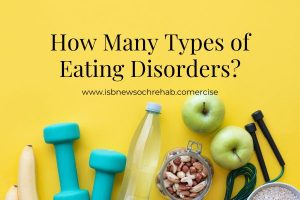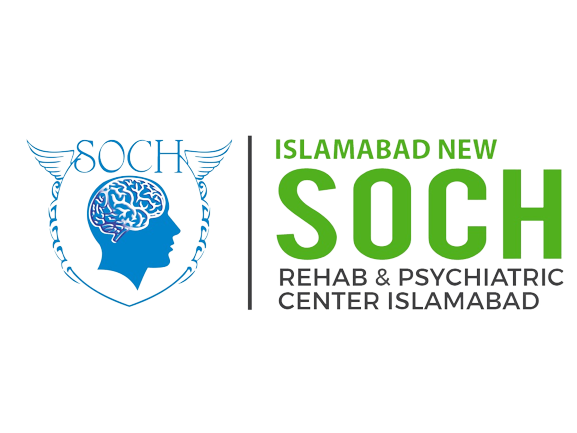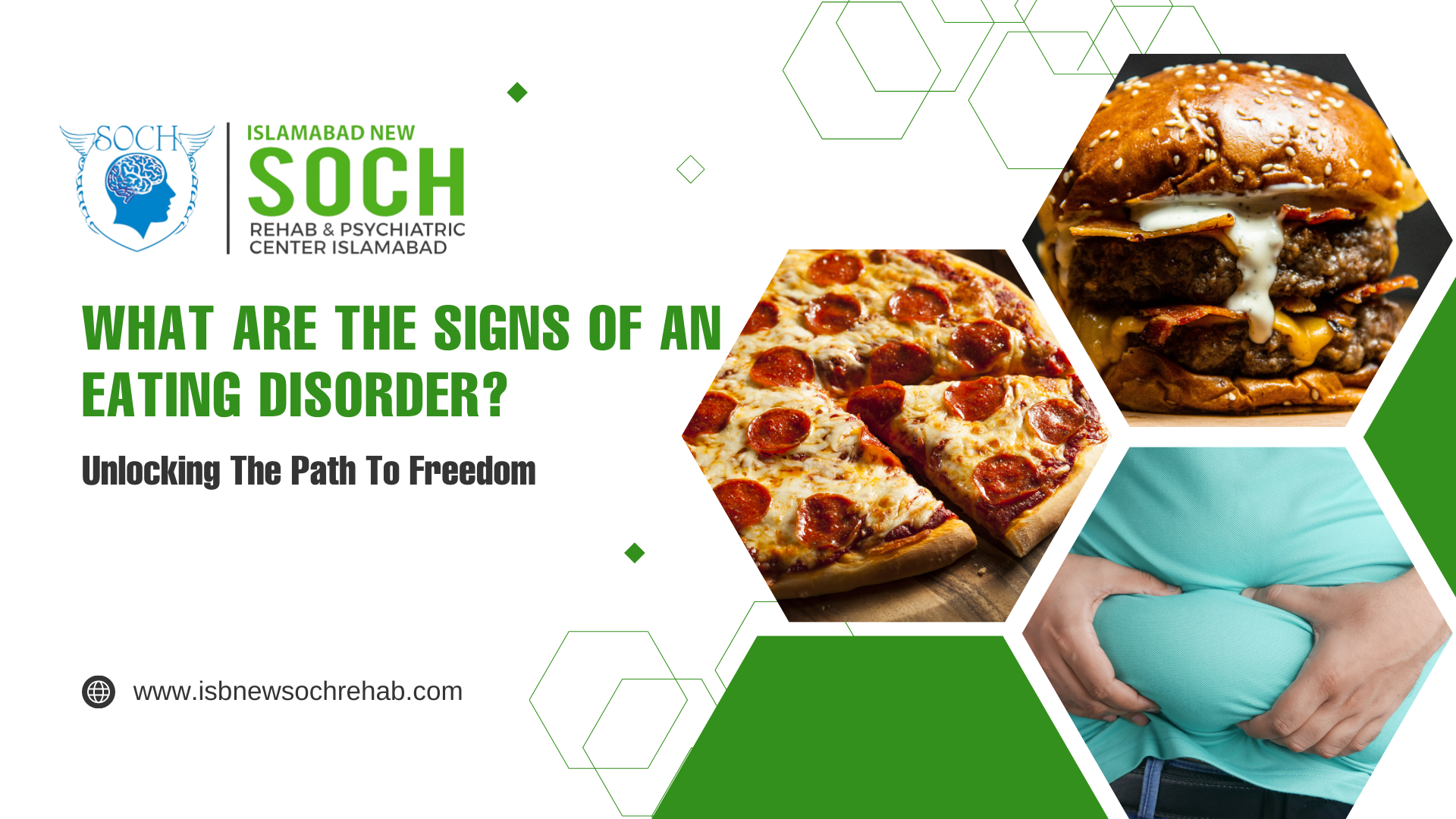Eating disorders are complex mental health conditions characterized by severe disturbances in eating behaviors and a distorted body image. Common types include anorexia nervosa, bulimia nervosa, and binge eating disorder. Other specified feeding or eating disorders (OSFED) encompass a range of disordered eating patterns that don’t meet full diagnostic criteria.
Early recognition of symptoms, such as preoccupation with food, weight, and body image, is crucial for intervention and support. Healthcare professionals play a vital role in detecting and treating eating disorders, promoting recovery and improved quality of life for affected individuals.
What are the signs of an eating disorder?
The signs of an eating disorder can vary depending on the specific type of disorder, but there are common indicators to look out for. Some of the signs of an eating disorder may include:
Drastic weight loss or fluctuations:
Rapid and significant weight loss or extreme changes in weight can be a warning sign of an eating disorder, especially in a short period.
Preoccupation with food and calories:
Obsessive thoughts about food, counting calories, and rigid dietary restrictions are common in individuals with eating disorders.
Distorted body image:
An individual with an eating disorder may have a distorted perception of their body, seeing themselves as overweight even when they are underweight or at a healthy weight.
Avoidance of meals or eating rituals:
Frequent avoidance of meals, making excuses to skip meals, or developing rigid eating rituals (e.g., cutting food into small pieces, arranging food in a specific way) can indicate disordered eating patterns.
Excessive exercise:
Engaging in compulsive and excessive exercise, even when injured or unwell, can be a sign of an eating disorder.
Changes in eating behaviors:
Evidence of secretive eating, strict food rules, or unusual eating patterns (e.g., eating in isolation, avoiding social meals) may be present.
Social withdrawal and mood changes:
Individuals with eating disorders may withdraw from social activities, become more isolated, or experience frequent mood swings, anxiety, or depression.
Physical symptoms:
Physical signs can include fatigue, dizziness, weakness, frequent fainting, hair loss, dry skin, and digestive issues.
It’s important to note that these signs are not exhaustive, and an individual may display a combination of these or other symptoms. If you suspect someone may have an eating disorder, it is essential to encourage them to seek professional help from a healthcare provider or therapist specializing in eating disorders.
and some more Signs Of An Eating Disorder?
What causes eating disorders?
The exact causes of eating disorders are complex and multifaceted, involving a combination of genetic, psychological, environmental, and social factors. While the underlying causes may vary among individuals, several common factors contribute to the development of eating disorders:
Genetic and biological factors:
There is evidence to suggest a genetic predisposition to eating disorders, with certain individuals being more susceptible than others. Hormonal imbalances, neurotransmitter abnormalities, and irregularities in brain structure and function also play a role.
Psychological factors:
Low self-esteem, perfectionism, body dissatisfaction, and negative body image are psychological factors that can contribute to the development of eating disorders. Individuals with eating disorders often struggle with feelings of inadequacy and a desire for control.
Sociocultural influences:
Societal pressure to conform to certain body ideals, unrealistic media portrayals of thinness, and cultural emphasis on appearance can significantly impact body image and contribute to the development of eating disorders.
Family and environmental factors:
Dysfunctional family dynamics, history of childhood trauma, neglect, or abuse, and a family history of eating disorders can increase the risk of developing an eating disorder. Cultural and environmental factors, such as participation in certain sports or professions that emphasize thinness, can also influence the development of disordered eating patterns.
Psychological disorders and comorbidities:
Eating disorders often coexist with other mental health conditions such as depression, anxiety disorders, obsessive-compulsive disorder (OCD), and substance abuse, indicating a complex interplay between these disorders.
It’s important to note that each individual’s experience with an eating disorder is unique, and not everyone with these risk factors will develop an eating disorder. Understanding the multifactorial nature of eating disorders helps guide prevention efforts and supports the need for comprehensive, individualized treatment approaches that address the underlying causes and promote recovery.

How Many Types of Eating Disorders?
There are several types of eating disorders, each characterized by distinct patterns of disordered eating behaviors and associated symptoms. The most common types of eating disorders include:
Anorexia Nervosa:
Individuals with anorexia nervosa have an intense fear of gaining weight or becoming fat. They typically engage in extreme food restriction, leading to significant weight loss. People with anorexia may have a distorted body image and perceive themselves as overweight, even when they are severely underweight.
Bulimia Nervosa:
Bulimia nervosa involves recurrent episodes of binge eating, where individuals consume large amounts of food in a short period and feel a loss of control during these episodes. These episodes are followed by compensatory behaviors such as self-induced vomiting, excessive exercise, or misuse of laxatives to prevent weight gain.
Binge Eating Disorder:
Binge eating disorder is characterized by recurrent episodes of excessive food consumption, often accompanied by a feeling of loss of control. Individuals with binge eating disorder do not engage in compensatory behaviors like vomiting or excessive exercise. They may experience distress, guilt, and shame following binge episodes.
Avoidant/Restrictive Food Intake Disorder (ARFID):
ARFID involves an extreme avoidance or restriction of certain foods or food groups. It is not driven by concerns about weight or body shape but may be due to sensory sensitivities, fears of aversive consequences, or lack of interest in eating.
Other Specified Feeding or Eating Disorders (OSFED):
OSFED, previously known as Eating Disorder Not Otherwise Specified (EDNOS), includes eating disorders that do not meet the full diagnostic criteria for anorexia nervosa, bulimia nervosa, or binge eating disorder but still significantly impact an individual’s well-being.
It’s important to note that eating disorders are complex conditions, and individuals may exhibit a combination of symptoms or behaviors from different types of eating disorders. Seeking professional help is crucial for accurate diagnosis and appropriate treatment of these conditions.
How do you know if you have an eating disorder?
Determining if you have an eating disorder requires a comprehensive evaluation by a qualified healthcare professional, such as a doctor, psychologist, or eating disorder specialist. However, there are certain signs and symptoms that may indicate the presence of an eating disorder. Here are some indications to consider:
Distorted body image:
A preoccupation with weight, body shape, and appearance, along with a distorted perception of one’s own body, is common in eating disorders. You may perceive yourself as overweight even when objectively underweight.
Disordered eating behaviors:
Extreme food restriction, fasting, binge eating (consuming large amounts of food in a short period), self-induced vomiting, excessive exercise, or misuse of laxatives or diuretics are signs of disordered eating.
Drastic weight changes:
Rapid and significant weight loss or weight fluctuations without a medically justified reason can be a red flag.
Obsession with food and calories:
Constantly thinking about food, meticulously counting calories, or adhering to strict dietary rules may indicate an unhealthy relationship with food.
Emotional and psychological factors:
Feelings of guilt, shame, anxiety, or depression related to food, eating, or body image are common in eating disorders.
Physical symptoms:
Fatigue, dizziness, weakness, hair loss, brittle nails, thinning of hair, dry skin, digestive issues, irregular menstruation, and cold intolerance are some physical manifestations of eating disorders.
Social withdrawal and avoidance of social situations involving food:
A tendency to isolate oneself, avoid meals with others, or withdraw from social activities due to fear of eating in public may suggest an eating disorder.It is essential to remember that this list is not exhaustive, and the presence of one or more of these signs does not necessarily mean you have an eating disorder.
A professional evaluation is crucial to obtain an accurate diagnosis and receive appropriate treatment. If you suspect you may have an eating disorder, reach out to a healthcare professional who specializes in eating disorders for an evaluation and support.
Eating Disorder Treatment
New Soch Rehab, located in Islamabad, provides comprehensive and specialized treatment for individuals struggling with eating disorders. With their expertise in the field of mental health and eating disorder treatment, they offer a supportive and compassionate environment for individuals seeking recovery.
The treatment approach at New Soch Rehab is tailored to address the unique needs of each individual, focusing on both the physical and psychological aspects of the disorder. The dedicated team of professionals, including therapists, psychologists, and nutritionists, collaboratively work with clients to develop personalized treatment plans.
These plans may include individual therapy, group therapy, family therapy, nutritional counseling, and psychiatric support as needed. New Soch Rehab emphasizes a holistic approach to treatment, recognizing the importance of addressing underlying psychological factors, developing healthy coping mechanisms, and promoting positive body image.
Through evidence-based therapies, ongoing support, and a nurturing environment, New Soch Rehab strives to empower individuals on their journey towards recovery from eating disorders and towards a healthier and more fulfilling life.
Conclusion
In conclusion, eating disorders are complex and serious mental health conditions that can have devastating effects on individuals’ physical and psychological well-being. Recognizing the signs and symptoms of an eating disorder is crucial for early intervention and treatment. Seeking professional help from qualified healthcare providers and specialized treatment centers is essential in addressing the underlying causes, providing appropriate support, and promoting recovery.
A comprehensive approach to treatment, encompassing both physical and psychological aspects, is key to effectively addressing eating disorders. Through personalized treatment plans, therapy, nutritional support, and a supportive environment, individuals can work towards overcoming their eating disorders and achieving a healthier relationship with food, body image, and self-esteem.
With the right guidance and support, individuals affected by eating disorders can embark on a journey towards healing, improved well-being, and a better quality of life.

